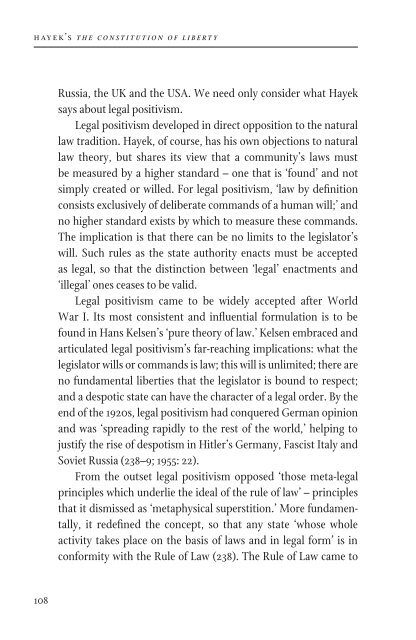Hayek's The Constitution of Liberty - Institute of Economic Affairs
Hayek's The Constitution of Liberty - Institute of Economic Affairs
Hayek's The Constitution of Liberty - Institute of Economic Affairs
Create successful ePaper yourself
Turn your PDF publications into a flip-book with our unique Google optimized e-Paper software.
h ay e k ’ s t h e c o n s t i t u t i o n o f l i b e r t y<br />
t h e r u l e o f l aw a n d i t s d e t r a c t o r s<br />
Russia, the UK and the USA. We need only consider what Hayek<br />
says about legal positivism.<br />
Legal positivism developed in direct opposition to the natural<br />
law tradition. Hayek, <strong>of</strong> course, has his own objections to natural<br />
law theory, but shares its view that a community’s laws must<br />
be measured by a higher standard – one that is ‘found’ and not<br />
simply created or willed. For legal positivism, ‘law by definition<br />
consists exclusively <strong>of</strong> deliberate commands <strong>of</strong> a human will;’ and<br />
no higher standard exists by which to measure these commands.<br />
<strong>The</strong> implication is that there can be no limits to the legislator’s<br />
will. Such rules as the state authority enacts must be accepted<br />
as legal, so that the distinction between ‘legal’ enactments and<br />
‘illegal’ ones ceases to be valid.<br />
Legal positivism came to be widely accepted after World<br />
War I. Its most consistent and influential formulation is to be<br />
found in Hans Kelsen’s ‘pure theory <strong>of</strong> law.’ Kelsen embraced and<br />
articulated legal positivism’s far-reaching implications: what the<br />
legislator wills or commands is law; this will is unlimited; there are<br />
no fundamental liberties that the legislator is bound to respect;<br />
and a despotic state can have the character <strong>of</strong> a legal order. By the<br />
end <strong>of</strong> the 1920s, legal positivism had conquered German opinion<br />
and was ‘spreading rapidly to the rest <strong>of</strong> the world,’ helping to<br />
justify the rise <strong>of</strong> despotism in Hitler’s Germany, Fascist Italy and<br />
Soviet Russia (238–9; 1955: 22).<br />
From the outset legal positivism opposed ‘those meta-legal<br />
principles which underlie the ideal <strong>of</strong> the rule <strong>of</strong> law’ – principles<br />
that it dismissed as ‘metaphysical superstition.’ More fundamentally,<br />
it redefined the concept, so that any state ‘whose whole<br />
activity takes place on the basis <strong>of</strong> laws and in legal form’ is in<br />
conformity with the Rule <strong>of</strong> Law (238). <strong>The</strong> Rule <strong>of</strong> Law came to<br />
mean nothing more than ‘the demand for legality, the requirement<br />
<strong>of</strong> a legal foundation for any act <strong>of</strong> the state.’ It thereby<br />
‘ceased to have any significance as a guarantee <strong>of</strong> individual<br />
freedom, since any oppression, however arbitrary or discriminatory,<br />
could be legalized by a law authorizing an authority to act<br />
in such a manner’ (1955: 27). Hayek does detect some signs <strong>of</strong> a<br />
reaction against legal positivism and similar doctrines (247–9),<br />
but there remains an urgent need to clarify and restore the Rule<br />
<strong>of</strong> Law.<br />
108<br />
109












